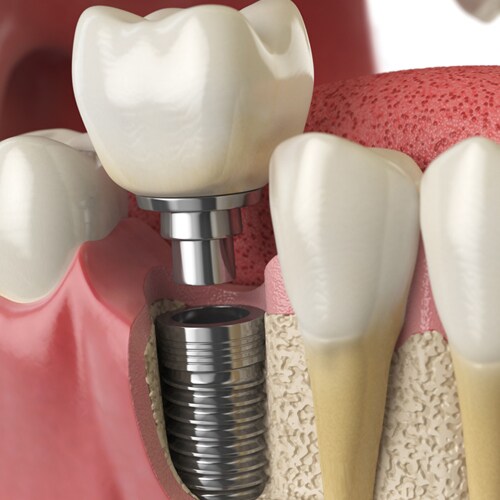The demand for dental implants has risen greatly over the last three decades. However, while the survival rate of dental implants has steadily improved, biological complications – notably, peri-implant mucositis and peri-implantitis – still present a challenge for both patients and dental professionals.
How common are peri-implant mucositis and peri-implantitis?
Studies into the prevalence of peri-implant disease offer varying estimates. A 2017 systematic review and meta-analysis in the Journal of Dentistry analysed 47 studies, finding a weighted mean prevalence for patients of 46.83% for peri-implant mucositis and 19.83% for peri-implantitis.
Risk factors for peri-implant disease
Patients seeking dental implants often have a history of sub-optimal oral care and of oral disease, including periodontal disease, that ultimately led to loss of tooth structure and/or bone. The same patients may still present with oral pathologies. Indeed, biofilm accumulation was confirmed in a systematic review to lead to the development of peri-implant mucositis. Peri-implant disease associated with poor oral care can be due to lack of motivation or an inability to clean around implants, for example due to poor implant positioning or an ill-fitting poorly-designed prosthesis.
Some other risk factors for peri-implant disease include:
- Smoking cigarettes
- A history of periodontal disease
- Poorly-controlled diabetes
Preventing peri-implant inflammation
The American College of Prosthodontics (ACP) states that patients will require lifelong recall and customized professional maintenance in order to preserve the health of dental implants. The ACP clinical practice guidelines provide recommendations for the management of patients with implant-borne dental restorations.
For patients with no risk factors for peri-implant disease, proactively encourage a six-monthly dental examination to monitor for inflammation and take early preventative action where necessary. Patients with identified clinical or behavioral risk factors will need to be monitored more frequently.
Professional maintenance
The ACP recommends a full extra-oral and intra-oral health and dental assessment at each appointment. Oral hygiene coaching and instructions for patients are also recommended, including hygiene advice for removable components or prostheses if applicable.
Early intervention, such as the frequent professional cleaning of natural teeth, implants or abutments, can be instrumental in preventing peri-implant inflammation. When a topical antimicrobial agent is needed, the ACP recommends using a chlorhexidine gluconate product.
At-home care
Patients of course need to know ahead of time what home care and professional maintenance will be required for implant-borne dental restorations. They can be advised to brush twice daily with a toothpaste, which provides anti-plaque and other benefits, and to use additional hygiene aids such as dental floss and implant-specific aids. This simple and holistic approach helps to prevent and reduce biofilm accumulation. If clinically indicated, a chlorhexidine gluconate product like Colgate PerioGard can also be prescribed.
Tackling misconceptions about peri-implant disease
We know that much of the work in preventing peri-implant disease happens outside of the dental office, but there’s a mistaken belief among many patients that an implant is a hands-off, low- or no-maintenance solution. A part of our role in preventing peri-implant disease, then, is combating these misconceptions.
When discussing implant care with your patients, the following talking points may be helpful:
- While an implant is strong and durable, the soft tissues and bone surrounding it are still vulnerable to inflammation and disease.
- Implants can also be colonized by bacteria where they protrude above the bone and gum and need to be cared for just as thoroughly as natural teeth.
- Good oral hygiene helps to prevent peri-implant mucositis and peri-implantitis.
- Peri-implant mucositis can be treated before it progresses to peri-implantitis, at which point progression can eventually result in loss of the implant. To illustrate this point, it can be helpful to draw a comparison to gingivitis and periodontitis, as patients are likely to be more familiar with these conditions.
When patients understand the importance of preserving their implant in the context of their oral and overall health, they are more likely to be incentivized to invest time in proper oral hygiene and maintenance visits. When taking the time to educate patients and provide them with the tools they need, it also helps to demonstrate that you genuinely care about their long-term oral health.

